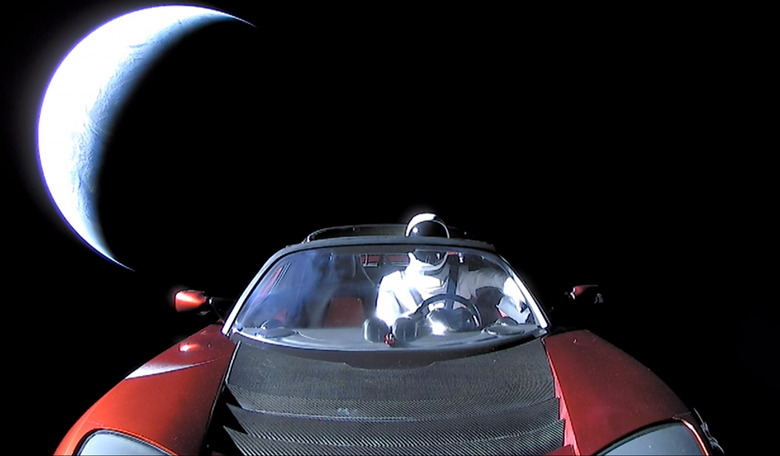New Website Tracks Musk's Tesla Roadster And Starman As They Fly Through Space
After weather forced SpaceX to delay the launch multiple times, Elon Musk's aerospace company launched its massive Falcon Heavy rocket into space on February 6th. It was an incredible feat, and the world watched along as SpaceX streamed the event live from the ground in Cape Canaveral. Many thought the gigantic rocket would be doomed on this first attempt, and even Musk appeared to be shocked that the launch went off without a hitch — in fact, Musk's exact words were, "Holy flying f–k, that thing took off!"
The Falcon Heavy's 27 rockets propelled the huge craft gracefully as it barreled toward and then broke through the Earth's atmosphere. While the rocket's center core didn't touch back down as expected, both side boosters separated perfectly and landed on their targets so they can be reused in subsequent launches. There's precious little question that the launch was a resounding success, as was the release of the Falcon Heavy's main payload: Elon Musk's personal Tesla Roadster and its mannequin pilot Starman.
Pictured in the photo at the top of this post, Starman and his electric-car-turned-spacecraft were equipped with cameras that live-streamed the car's journey as it floated through space. Unfortunately, the Roadster's transmission didn't last quite as long as expected. The batteries were expected to broadcast for at least 12 hours, but they ended up dying after only 4 hours of transmission. Sadly, that left space enthusiasts in the dark, wondering how Starman was doing as he piloted his convertible through the cosmos.
Sadly, the Roadster's onboard cameras will never begin transmitting again. But the good news is that there is now a special website created by developer Ben Pearson that is tracking Starman's journey through space in real time.
Called simply "Where is Starman?" the site updates constantly, allowing visitors to learn exactly where Musk's Tesla Roadster is at any given time. Updates are offered in text form, with distances from the Earth, Mars and the Sun offered in miles, kilometers, and astronomical units (AU). The site even informs visitors how far the Roadster is beyond its factory 36,000 mile warranty.
Here's an example of the data you'll see when visiting the site:
On February 6th, 2018, at 2045 UTC, the first Falcon Heavy was launched into space. It contained a very special payload- a Tesla Roadster with Starman.
But where is this vehicle? The current location is 2,542,148 miles (4,091,191 km, 0.027 AU) from Earth, moving away from Earth at a speed of 7,564 miles/hour (12,174 km/hour, 3.38 km/s).
The car is 135,777,432 miles (218,512,663 km, 1.461 AU) from Mars, moving toward the planet at a speed of 43,240 miles/hour (69,587 km/hour, 19.33 km/s).
The car is 92,315,095 miles (148,566,790 km, 0.993 AU) from the Sun, moving away from the star at a speed of 2,617 miles/hour (4,211 km/hour, 1.17 km/s).
The car exceeded its 36,000 mile warranty 696.4 times while driving around the Sun, (25,071,243 miles, 40,348,267 km, 0.27 AU) moving at a speed of 71,459 miles/hour (115,003 km/hour, 31.95 km/s). It has achieved a fuel economy of 199.0 miles per gallon (84.6 km/liter, 1.18211 liters/100 km), assuming 126,000 gallons of fuel.
Assuming the battery still works, Starman has listened to Space Oddity 3,760 times since launch.
The last line refers to David Bowie's hit song Space Oddity, which was being played on loop on the Roadster's stereo at launch.
An animated chart is also available on the site, and it allows visitors to see exactly where Starman's Roadster is in relation to the Sun, Mercury, Venus, Earth, Mars, and Ceres. A slider beneath the graphic can be dragged into the future to display an estimate of the Roadster's location at any given time between the present day and November 14th, 2020.
Where will the Roadster finally end up? Experts believe it may ultimately crash into the Earth or the Sun, but not until "a few tens of millions of years" from now.
